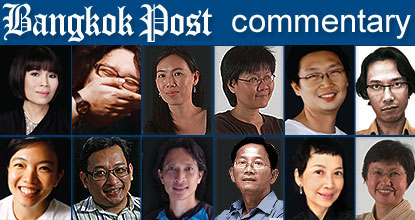
The board is set. If all the players keep moving the way they have been, it’s likely the end game will be martial law.
The People’s Democratic Reform Committee (PDRC) may not mind that. As long as they can get rid of this government and delay a new election, even a military coup would be acceptable.
The United Front for Democracy against Dictatorship (UDD) would condemn the option.
But deep down, however, the pro-election red shirts could probably afford to let it happen, since such a development would benefit them in the long run.
A semi-military takeover would rouse the red-shirt base, draw crowds to its rallies and consolidate its pro-democracy stance more than anything that has happened during the past few months.
Would martial law be a good option then? A circuit breaker so to speak? A necessary evil that will at least temporarily force all warring factions to take a step back and avert clashes that could take a heavy toll?
I don’t think so.
The reason is simple. Despite it being a convenient short-term solution, intervention by the army will never sort out the political conflicts entangling us.
Indeed, as shown by the last coup, an armed interpolation might settle strife for a short time, but end up generating the sort of deeper and more divisive feelings of disenfranchisement that have spread and taken root.
We are here, stuck at this juncture where different groups of people want to go into opposite directions, because of that short-sighted military way out. There is no reason to repeat the same mistake.
The problem, however, is that every key political player is thinking more about their vested interests than reason.
One might ask, what is reasonable under the circumstances?
To me, it’s sensible to assume that all of these key players have reached the end of the road.
Suthep Thaugsuban can keep walking. He can go on issuing ultimatums and telling civil servants to report to him. but the PDRC leader and veteran politician must realise he is running out of moves.
Without anything more solid from the established institutions, Mr Suthep’s vow to set up a self-appointed sovereign power is just hot air.
It’s highly possible the last card Mr Suthep has to throw in to the self-proclaimed “Thai uprising” will be his own surrender. Carefully staged, that act could cap the longest political protest. It would provide a dignified enough end, a self-sacrificing one, to the movement that has maintained it is “non-violent” in nature.
The Senate may try to press ahead with its attempt to appoint an interim prime minister under Section 7 of the charter.
However, as days go by, more doubts and dissenting voices emerge both from senators themselves and legal experts. They question whether the option would help relieve the conflict or worsen it.
What is obvious now is that the existing caretaker government won’t quit to create an administrative vacuum. If the Senate goes ahead and appoints an interim premier, we will end up with two leaders.
The red shirts won’t accept an appointed prime minister either. And we still have no idea how a Section 7 premier could work under the charter and the present political conditions, with the Senate being the only legislative body left. What will be the mandate?
What will be the mission? On what legal basis can the mission be executed? It’s not even known yet who would dare to take up the post, even if it’s made available. Who will be tough enough for the lighting rod job?
The prospects of appointing a prime minister under Section 7 are looking slim.
The caretaker government can claim the moral high ground and keep pushing for a new election to be held as soon as possible, just as it has done for the past few months.
The problem with that option is also plain to see. It’s not that PDRC supporters will try to obstruct voting or that the opposition Democrat Party may boycott the poll again.
It’s that the caretaker government could do nothing to improve the situation. It could not provide a safe environment for voting, nor did it dare take strict legal action against those who blocked the polls. It could not even strike an agreement with the EC on the very simple issue of a new poll date.
There is no road ahead that will offer any political group everything it wants. Simply continuing to push for an election, reform or a Section 7 prime minister will only deepen the crisis to the point when a military takeover will become inevitable.
Atiya Achakulwisut is contributing editor, Bangkok Post.